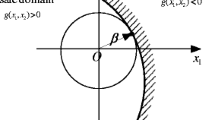Abstract
A random sampling approach is presented for worst-case design of structures. Uncertainties are considered in structural and material parameters, which are assumed to exist in intervals with prescribed upper and lower bounds. Constraints are given for the worst responses that are found by solving anti-optimization problems. Optimal cross-sections are then selected from the list of available sections. The regions of uncertainty of parameters are discretized into integer values to formulate the hybrid problem of optimization and anti-optimization as an integer programming problem. The accuracy of solution is defined based on the order of the objective value; hence, a random sampling approach is successfully applied to obtain optimal and anti-optimal solutions within the prescribed accuracy. It is shown in the numerical examples that a good approximate optimal solution is found by random sampling with small number of analyses.













Similar content being viewed by others
References
Aarts E, Korst J (1989) Simulated annealing and boltzmann machines: a stochastic approach to combinatorial optimization and neural computing. Wiley, Chichester
Augusti G, Barratta A, Casciati F (1984) Probabilistic methods in structural engineering. Chapman and Hall, New York
Domingo C, Gavalda R, Watanabe O (1999) Adaptive sampling methods for scaling up knowledge discovery algorithms. Lecture notes in computer science, vol 1721. Springer
Elishakoff I, Ohsaki M (2010) Optimization and anti-optimization of structures under uncertainty. Imperial College Press
Elishakoff I, Li YW, Starnes JH Jr (1994) A deterministic method to predict the effect of unknown-but-bounded elastic moduli on the buckling of composite structures. Comput Methods Appl Mech Eng 111(1–2):155–167
Frangopol DM (1995) Reliability-based optimum structural design. In: Sundararajan C (ed) Probabilistic structural mechanics handbook: theory and industrial applications. Chapman & Hall, New York, pp 352–387
Glover F (1989) Tabu search—part I. ORSA J Comput 1:190–206
Goldberg DE (1989) Genetic algorithms in search, optimization, and machine learning. Addison-Wesley, Reading
Gu X, Renaud JE, Batill SM, Brach RM, Budhiraja AS (2000) Worst-case propagated uncertanity in multidisciplinary systems in robust design optimization. Struct Multidisc Optim 20:190–213
Hosking JRM (1990) L-moments: analysis and estimation of distributions using linear combinations of order statistics. J R Stat Soc Ser B 52:105–127
Iyengar RN, Rao PN (1979) Generation of spectrum compatible accelerograms. Earthquake Eng Struct Dyn 7:253–2639
Kanno Y, Guo X (2010) A mixed integer programming for robust truss topology optimization with stress constraints. Int J Numer Methods Eng 83:1675–1699
Kennedy J (1997) The particle swarm: social adaptation of knowledge. In: Proc. int. conf. evolutionary computation. IEEE, Piscataway, pp 303–308
Lipton R, Naughton J (1995) Query size estimation by adaptive random search. J Comput Syst Sci 51:18–25
Luus R, Jaakola THI (1973) Optimization by direct search and systematic reduction of the size of search region. AIChE J 19:760–766
Mitzenmacher M, Upfal E (2005) Probability and computing: randomized algorithm and probabilistic analysis. Cambridge University Press
Moore RE (1966) Interval analysis. Prentice-Hall, Englewood Cliffs
Noh Y, Choi KK, Du L (2009) Reliability-based design optimization of problems with correlated input variables using a Gaussian Coupla. Struct Multidisc Optim 38:1–16
Ohsaki M (1995) Genetic algorithm for topology optimization of trusses. Comput Struct 57(2):219–225
Ohsaki M (2001) Random search method based on exact reanalysis for topology optimization of trusses with discrete cross-sectional areas. Comput Struct 79(6):673–679
Ohsaki M (2010) Optimization of finite dimensional structures. CRC Press
PEERC (2006) Open system for earthquake engineering simulation (OpenSees). UCB, CA. Available at http://opensees.berkeley.edu/
Rustem B, Howe M (2002) Algorithms for worst-case design and applications to risk management. Princeton University Press, Princeton
Salcedo R, Goncalves MJ, Feyo de Azevedo S (1990) An improved random-search algorithm for non-linear optimization. Comput Chem Eng 14(10):1111–1126
Schutte JF, Groenwold AA (2003) Sizing design of truss structures using particle swarm. Struct Multidisc Optim 25:261–269
Valdebenito MA, Scuëller GI (2010) A survey on approaches for reliability-based optimization. Struct Multidisc Optim 42:645–663
Yasudada K, Iwasaki N, Ueno G, Aiyoshi E (2008) Particle swarm optimization: a numerical stability analysis and parameter adjustment based on swarm activity. IEEE Trans Electrical Electronic Eng 3:642–659
Author information
Authors and Affiliations
Corresponding author
Rights and permissions
About this article
Cite this article
Ohsaki, M., Katsura, M. A random sampling approach to worst-case design of structures. Struct Multidisc Optim 46, 27–39 (2012). https://doi.org/10.1007/s00158-011-0752-6
Received:
Revised:
Accepted:
Published:
Issue Date:
DOI: https://doi.org/10.1007/s00158-011-0752-6




